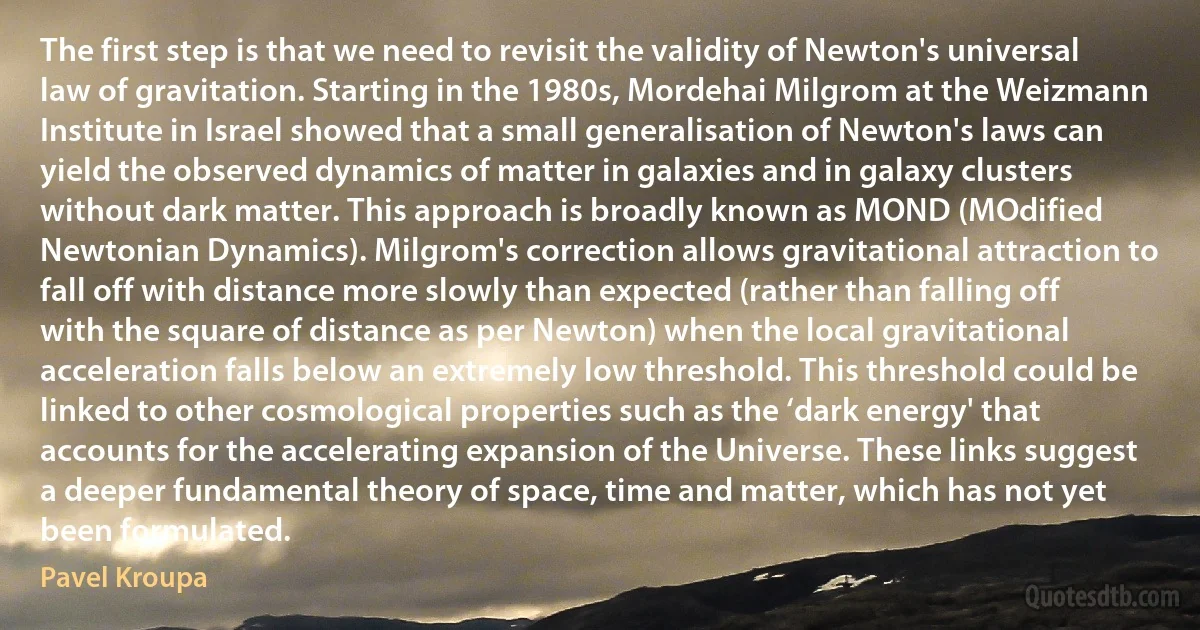
The first step is that we need to revisit the validity of Newton's universal law of gravitation. Starting in the 1980s, Mordehai Milgrom at the Weizmann Institute in Israel showed that a small generalisation of Newton's laws can yield the observed dynamics of matter in galaxies and in galaxy clusters without dark matter. This approach is broadly known as MOND (MOdified Newtonian Dynamics). Milgrom's correction allows gravitational attraction to fall off with distance more slowly than expected (rather than falling off with the square of distance as per Newton) when the local gravitational acceleration falls below an extremely low threshold. This threshold could be linked to other cosmological properties such as the ‘dark energy' that accounts for the accelerating expansion of the Universe. These links suggest a deeper fundamental theory of space, time and matter, which has not yet been formulated.
Pavel KroupaRelated topics
accelerating acceleration approach dark distance dynamics expansion falling fall fundamental galaxy gravitation institute known law low matter modified need newtonian off revisit small space square step time universal validity yet yield 1980s generalisation laws falls links newtonRelated quotes
Here is my proposal. Israel should announce an immediate unilateral cessation in retaliation against terrorist attacks. This moratorium would be in effect for a short period, say four or five days, to give the Palestinian leadership an opportunity to respond to the new policy. It would also make it clear to the world that Israel is taking an important step in ending what has become a cycle of violence. Following the end of the moratorium, Israel would institute the following new policy if Palestinian terrorism were to resume. It will announce precisely what it will do in response to the next act of terrorism. For example, it could announce the first act of terrorism following the moratorium will result in the destruction of a small village which has been used as a base for terrorist operations. The residents would be given 24 hours to leave, and then troops will come in and bulldoze all of the buildings.

Alan Dershowitz
It was a long way down. Before she had gone very far the curious dizziness she had known before came over her again, a dizziness not entirely induced by the spirals she whirled around, but a deeper, atomic unsteadiness as if not only she but also the substances around her were shifting. There was something queer about the angles of those curves. She was no scholar in geometry or aught else, but she felt intuitively that the bend and slant of the way she went were somehow outside any other angles or bends she had ever known. They led into the unknown and the dark, but it seemed to her obscurely that they led into deeper darkness and mystery than the merely physical, as if, though she could not put it clearly even into thoughts, the peculiar and exact lines of the tunnel had been carefully angled to lead through poly-dimensional space as well as through the underground-perhaps through time, too.

C. L. Moore
This mysterious something has been called God, the Absolute, Nature, Substance, Energy, Space, Ether, Mind, Being, the Void, the Infinite-names and ideas which shift in popularity and respectabilitywith the winds of intellectual fashion, of considering the universe intelligent or stupid, superhuman or subhuman, specific or vague. All of them might be dismissed as nonsense-noises if the notion of an underlying Ground of Being were no more than a product of intellectual speculation. But these names are often used to designate the content of a vivid and almost sensorily concrete experience-the "unitive" experience of the mystic, which, with secondary variations, is found in almost all cultures at all times. This experience is the transformed sense of self which I was discussing in the previous chapter, though in "naturalistic" terms, purified of all hocus-pocus about mind, soul, spirit, and other intellectually gaseous words.

Alan Watts
During my controlled near-death experiences, I've met Sir Isaac Newton, who died back in 1727 as often as I've met Saint Peter. They both hang out at the Heaven end of the blue tunnel of the Afterlife. Saint Peter is there because it's his job. Sir Isaac is there because of his insatiable curiosity about what the blue tunnel is, how the blue tunnel works.
It isn't enough for Newton that during his eighty-five years on Earth he invented calculus, codified and quantified the laws of gravity, motion and optics, and designed the first reflecting telescope. He can't forgive himself for having left it to Darwin to come up with the theory of evolution, to Pasteur to come up with the germ theory, and to Albert Einstein to come up with relativity. "I must have been deaf, dumb, and blind not to have come up with those myself,” he said to me. "What could have been more obvious?”.

Kurt Vonnegut
Not only was he ignorant, but he had not even those conditions within himself which made knowledge possible. All that there was developed of him, at present, was a fund of energy, self-esteem, hope, courage, and daring, the love of action, life, and adventure; his life was in the outward and present, not in the inward and reflective; he was a true ten-year old boy, in its healthiest and most animal perfection. What she was, the small pearl with the golden hair, with her frail and high-strung organization, her sensitive nerves, her half-spiritual fibres, her ponderings, and marvels, and dreams, her power of love, and yearning for self-devotion, our readers may, perhaps, have seen. But if ever two children, or two grown people, thus organized, are thrown into intimate relations, it follows, from the very laws of their being, that one must hurt the other, simply by being itself; one must always hunger for what the other has not to give.

Harriet Beecher Stowe
